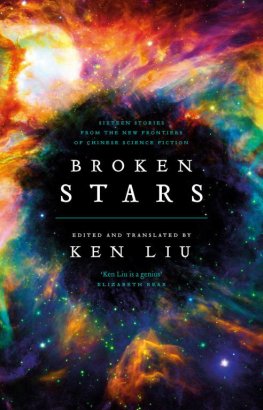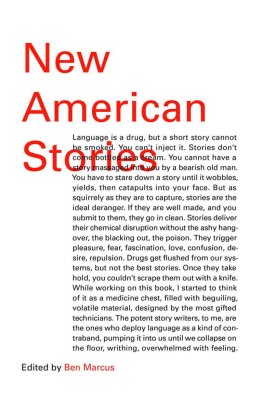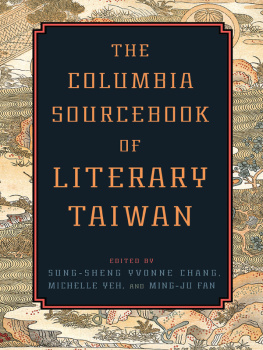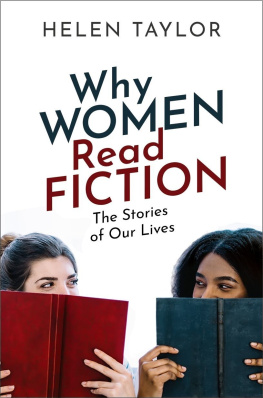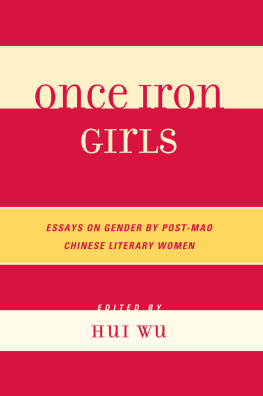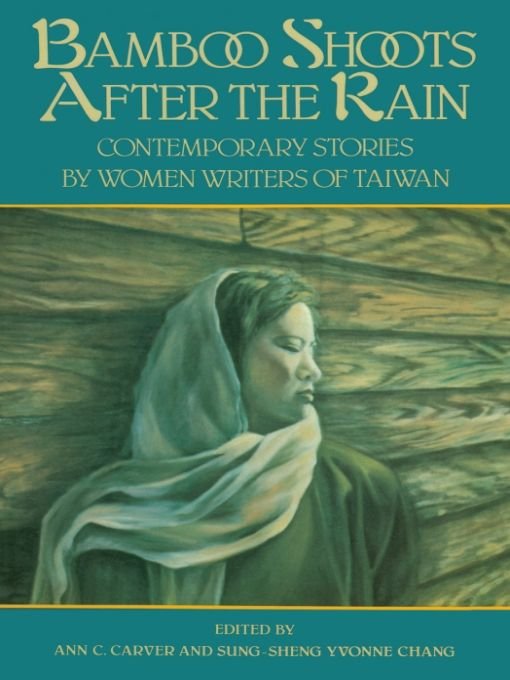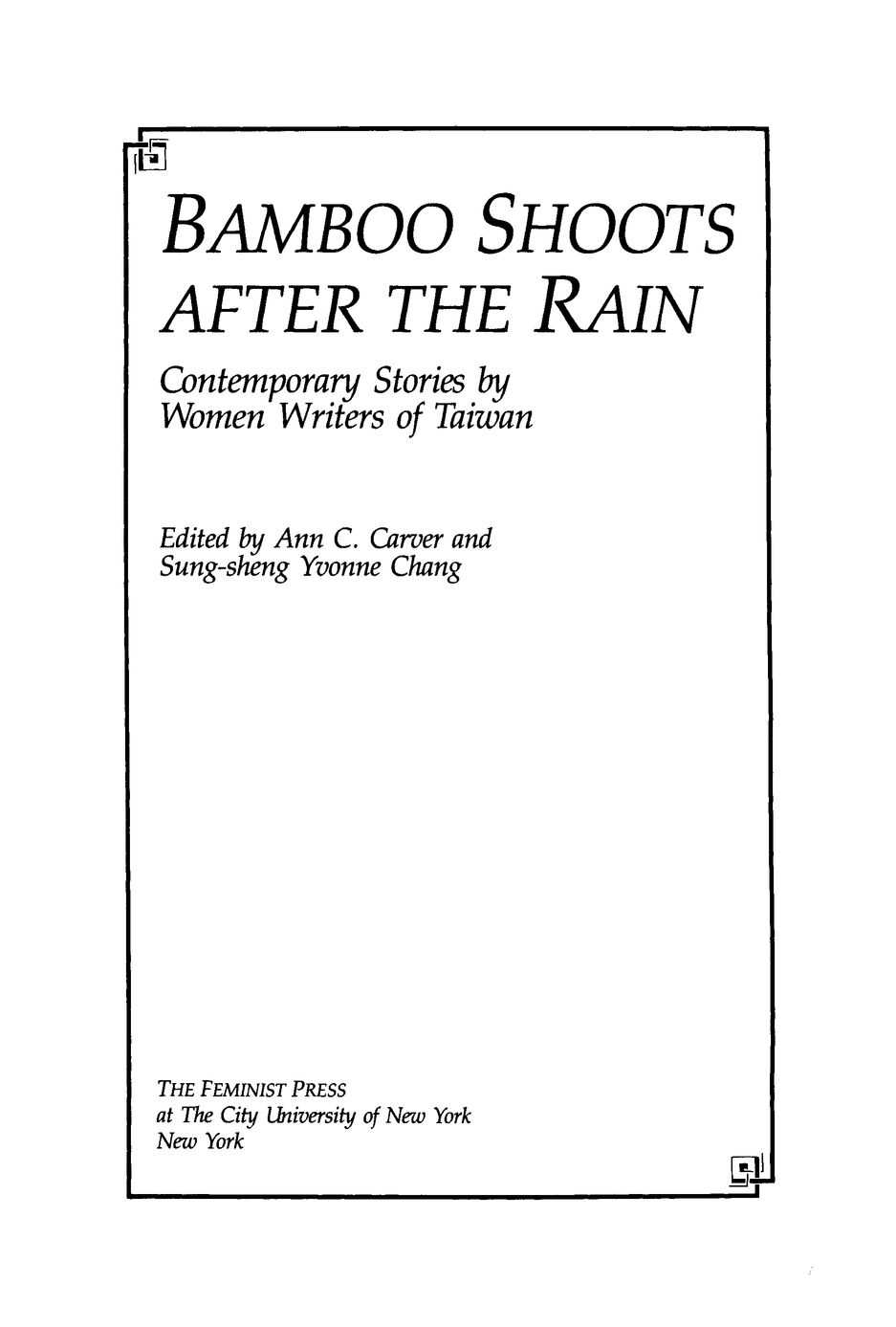Table of Contents
The title is drawn from the Chinese phrase y-hou chun-sun (after the rain, spring bamboo shoots), which is often used to describe the prodigious vitality with which things grow, especially after being interrupted by external forces. The bamboo also symbolizes resilience and the essential life force.
For our mothers
Aurelia Bush Cathey
Yu-lan Sun Chang
With love, admiration, and gratitude
PREFACE
The purpose of this anthology is to introduce to English-language readers representative works of Chinese womens literature from Taiwan (Republic of China) since 1949. The fiction by these writers is of particular interest for its impressive quality, quantity, and cultural significance. Women have been a major presence in each of the three generations of writers that make up Taiwans post-World War II literary history, and several are recognized as major figures in the canon. By the 1980s a majority of the writers being published in Taiwan were women. In 1986, eight of the ten best-sellers in fiction, poetry, and essays were written by women. Despite this success in their home setting, these writers are virtually unknown outside Taiwan.
The literature by Taiwans women writers provides a valuable introduction to the variety of womens experiences in a pivotal period of Taiwanese history and Chinese culture. The Chinese literature produced in Taiwan since 1949 reflects both the Republic of Chinas unique socio-economic and political history and, within that context, the unbroken evolution of traditional Chinese culture on the island. The literature by women writers in particular reflects the complexity of the post-war cultural evolution in Taiwan, with its simultaneous retention of traditional elements, overlaps with mainland (Peoples Republic of China) trends, regional modifications, dramatic breaks, and Western adaptations.
Because, in traditional Chinese society, the position and roles of women were so clear-cut, so precisely defined and enforced, the impact in Taiwan of Western culture, modernization, and capitalism has produced especially far-reaching and profound changes in the lives of women. A consequence of such rapid and extensive change has been to open up for questioning every facet of womens experience.
The fiction by Taiwans women writers treats the full range of womens lives, from childhood to old age, offering revealing views of gender issues and the evolution of Chinese culture in the modern age. It includes the experiences of women in a variety of economic classes and social positions from impoverished household worker to aristocrat, from roles within the family to paid employment outside the home. The literature reflects rural and urban life in mainland China and Taiwan through a sustained period of social and cultural change that spans almost the whole of the twentieth century. The subtlety of analysis and complexity of vision range from evocative dramatizations of culturally defined roles and images of women to analyses of the social structures that define and often entrap both women and men.
To reflect all these factors, the editors sought to include the following elements in this anthology: (1) authors considered by scholars and other readers of womens literature in Taiwan to be major figures of their generations based on quality as well as quantity or popularity; (2) vivid translations that evoke the world, characters, and events of the stories and the literary achievement of the originals; (3) selections that represent a variety of womens experiences, attitudes, and responses to traditional Chinese culture and to the rapidly changing society of Taiwan; (4) stories that include a range of class, gender, ethnic, age, and political perspectives; and (5) a collection that, read together, conveys an accurate introduction to the literature and culture of Taiwan as represented in the works of women writers.
From its inception, this anthology has been a cross-cultural collaboration, first between a Western teacher and her Chinese students and mentors and then between the two editors, one U.S.-born and one a native Chinese brought up in Taiwan who now lives in the United States. An important goal for the editors has been to present the stories in a context that can facilitate cross-cultural interpretation. The organization of the text and all supplementary materials has been designed to meet that goal.
In the Introduction, Sung-sheng Yvonne Chang discusses the three generations of Taiwans women writers as part of the major literary trends in Taiwan since 1949 and in relation to the transitions in the intellectual and sociopolitical environment. The stories themselves are grouped by generation, showing the range of response within each generation to womens lives, past and present, in Chinese culture and to the changing society of Taiwan. The books sections reveal the progression of themes and perspectives from one generation to the next.
Following the biographical headnotes that precede each story are brief literary introductions. The editors hold different cultural perspectives that influence their readings of the stories. Some of these differences have been preserved in discussions of individual stories. This approach is intended to encourage reflection on the problems of reading across cultures and on the complexity and diversity of womens experience represented in the stories. Ann Carvers essay Can One Read Cross-culturally? addresses the problems and rewards of reading the literature of an unfamiliar culture.
To assist those who wish to construct larger cultural contexts for reading literature from Taiwan, the editors offer a Selected Bibliography of modern literary works by women and men from both Taiwan and the Peoples Republic of China. It also includes literary criticism, interdisciplinary background readings on Chinese and Taiwanese history, culture, and women in society, and theoretical works on cross-cultural studies.
The editors hope this anthology will inspire respect and appreciation for the women of Taiwan and their heterogeneous cultures, experiences, and literary achievements. We also hope it will move readers to look more deeply into the culture, literature, and social history of Taiwan with heightened awareness of their complexity and significance.
Ann C. Carver
ACKNOWLEDGMENTS
The research and preparation of this anthology has been a cross-cultural process of dialogue and support from its inception. The project began when Ann Carver received a Visiting Research Professor Award from the National Science Council, Republic of China, which made possible the year she spent in Taiwan (1985-86) researching and teaching about women writers from Taiwan. Bamboo Shoots after the Rain was completed with a subsidy from the Pacific Cultural Foundation. For these grants we are deeply grateful.
Many colleagues and friends have provided advice, information, and encouragement. To all of them, we extend our appreciation. At the National Kaohsiung Teachers College, Taiwan, we would especially like to thank President Shou-shan Chang, Chen Ching-chi, Su Pi-chang, and the students in the course Studying Womens Literature from a Multicultural Perspective (1985-86). At the University of North Carolina at Charlotte, we would especially like to thank Paula Eckard and Judith Suther; also Cheryl Brown, Boyd H. Davis, Ruth Datta, Juanita Honeycutt, Kirby Long, Theodora Jankowski, Stan Patten, Margaret Smith, and Sherry Ward; and the students in the course Studying Womens Literature in Cultural Contexts (Spring 1987). We thank also Gloria Bien (Colgate University), through whom we met, and Ou-yang Tzu (Austin, Texas). We would also like to thank Florence Howe, Joanne OHare, and Susannah Driver of The Feminist Press for their advice and assistance.


